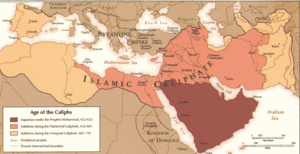Caliphate: Difference between revisions
imported>Meg Taylor No edit summary |
imported>Peter Jackson No edit summary |
||
| Line 8: | Line 8: | ||
The post of caliph has been held by the democratically elected [[Rashidun]] caliphs, and by the [[Monarchy|monarchist]] caliphates, successively the [[Umayyad]]s, the [[Abbasid]]s, and the [[Ottoman]]s. In addition to these widely recognized caliphates, numerous local rulers assumed the title. The [[Fatimid]]s of Egypt, who were the Imams of the Ismaili subdivision of the Shia, also used the title of caliph. | The post of caliph has been held by the democratically elected [[Rashidun]] caliphs, and by the [[Monarchy|monarchist]] caliphates, successively the [[Umayyad]]s, the [[Abbasid]]s, and the [[Ottoman]]s. In addition to these widely recognized caliphates, numerous local rulers assumed the title. The [[Fatimid]]s of Egypt, who were the Imams of the Ismaili subdivision of the Shia, also used the title of caliph. | ||
The [[Ottoman Empire|Ottoman]] caliphate was declared abolished by the Turkish Parliament in 1924 following [[Mustafa Kemal Atatürk|Mustafa Kemal]]'s revolution in [[Turkey]]. The following year, the Sharif of Mecca declared himself caliph, but he was deposed by the Saudis before the end of the year. In 1926, a semi-official international congress declared the caliphate suspended. Since then, there have been various attempts to re-establish the caliphate, [[Peace|peacefully]] and [[Violence|violently]]. For example, [[Hizb ul-Taheri]] seeks the peaceful re-establishment of the caliphate, while [[al-Qaeda]] seeks to re-establish it through armed [[jihad]]. Currently, the closest entity to the caliphate is the [[Organization of the Islamic Conference]]. | The [[Ottoman Empire|Ottoman]] caliphate was declared abolished by the Turkish Parliament in 1924 following [[Mustafa Kemal Atatürk|Mustafa Kemal]]'s revolution in [[Turkey]]. The following year, the Sharif of Mecca declared himself caliph, but he was deposed by the Saudis before the end of the year. In 1926, a semi-official international congress declared the caliphate suspended. Since then, there have been various attempts to re-establish the caliphate, [[Peace|peacefully]] and [[Violence|violently]]. For example, [[Hizb ul-Taheri]] seeks the peaceful re-establishment of the caliphate, while [[al-Qaeda]] seeks to re-establish it through armed [[jihad]]. Currently, the closest entity to the caliphate is the [[Organization of the Islamic Conference]]. In 2014 a gropu controlling substantial parts of Iraq and Syria proclaimed its leader Caliph, but he is not widely recognized. | ||
Revision as of 08:26, 30 June 2014
A caliphate (from the Arabic خلافة or khilāfah), is a form of government the Islamic that developed in the first half millennium after the life of Muhammad. The post of caliph comprises of the unity of head of state, head of government, and head of religion, and represents the political unity and leadership of the Muslim world. The literal meaning of caliph is 'successor', as in, successor to Muhammad's political authority.
By the Sunni muslim view, he is ideally a member of the Quraysh tribe elected democratically by the majority of the Muslim population. According to the Shi'a, he is an Imam descended directly from the Ahl ul-Bayt. According to the Ibadi view, any Muslim who is just and righteous is fit to take the post.
The post of caliph has been held by the democratically elected Rashidun caliphs, and by the monarchist caliphates, successively the Umayyads, the Abbasids, and the Ottomans. In addition to these widely recognized caliphates, numerous local rulers assumed the title. The Fatimids of Egypt, who were the Imams of the Ismaili subdivision of the Shia, also used the title of caliph.
The Ottoman caliphate was declared abolished by the Turkish Parliament in 1924 following Mustafa Kemal's revolution in Turkey. The following year, the Sharif of Mecca declared himself caliph, but he was deposed by the Saudis before the end of the year. In 1926, a semi-official international congress declared the caliphate suspended. Since then, there have been various attempts to re-establish the caliphate, peacefully and violently. For example, Hizb ul-Taheri seeks the peaceful re-establishment of the caliphate, while al-Qaeda seeks to re-establish it through armed jihad. Currently, the closest entity to the caliphate is the Organization of the Islamic Conference. In 2014 a gropu controlling substantial parts of Iraq and Syria proclaimed its leader Caliph, but he is not widely recognized.
